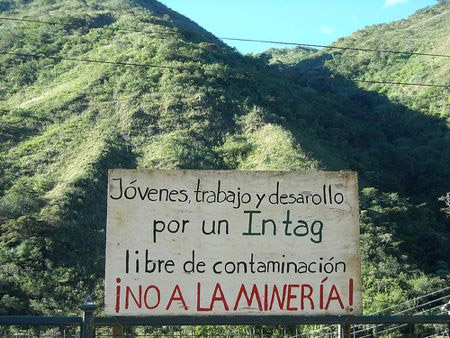
Last week the International Financial Corporation (IFC), a member of the World Bank Group, updated its Sustainability Framework and the Performance Standards within that framework.
The IFC is the largest multilateral source of loan and equity financing for private sector projects in the developing world. The Sustainability Framework sets forth a number of baseline performance standards that projects they fund (oil, gas, mining, etc) must adhere to in able to receive funding.
Now, these 8 standards leave a lot to be desired, they:
- are weak in environmental and biodiversity protection,
- lack comprehensive safeguards of human rights, and
- are written with an ambiguity that is often exploitable by companies looking to cut corners.
You can go to the Compliance Advisor/Ombudsman website to see a long list of officially disputed IFC backed projects.
However one Standard, Standard #7, became significantly stronger after this newest revision. Standard #7 directly addresses Indigenous People in relation to IFC projects, and this standard now includes the requirement of Free Prior and Informed Consent, or FPIC, from Indigenous communities in which a project is proposed.
FPIC, according to the UN, recognizes Indigenous Peoples inherent and prior rights to their lands and resources and respects their legitimate authority to require that third parties enter into an equal and respectful relationship with them, based on the principle of informed consent . Essentially, FPIC means you need the permission of the community to develop a project.
No permission, no project. Period.
Oxfam has developed a good primer to understanding what FPIC means to communities and extractive industries, Guide to Free Prior and Informed Consent (PDF). Likewise, Amazon Watch recently published FPIC – The Right to Decide that focuses on the roles and responsibilities of companies, investors and finance institutions to identify, prevent and address the adverse human rights impacts of company operations .
It is imperative the FPIC be a precondition when companies are pushing to develop mining projects. We ve seen what happens when companies attempt to circumnavigate the communities they will impact. A recent example was the rejection on the Bear Creek silver mine in Peru, where communities protested the mine until the permit was rejected. The next day Bear Creek’s stock plunged 27%, arguably because they did not receive FPIC and had the audacity to push through with the project.
The IFC catches a lot of (well deserved) heat for its investments. Yet, when they get it right they should be applauded, and I think this is a great step forward. Until now projects receiving IFC funding merely had to consult with impacted Indigenous communities, listening to concerns, but under no obligation to operate with respect to those concerns. The new language in the framework will hopefully set a new precedent to how extractive industries are held accountable to the communities they propose projects in.
Here is some of the new language:
To ensure the Free, Prior, and Informed Consent (FPIC) of the Affected Communities of Indigenous Peoples when the circumstances described in this Performance Standard are present.
In addition to the General Requirements of this Performance Standard, the client will obtain the FPIC of the Affected Communities of Indigenous People Where significant project impacts on critical cultural heritage.
Where significant project impacts on critical cultural heritage are unavoidable, the client will obtain the FPIC of the Affected Communities of Indigenous Peoples.
You can read the entire Performance Standard here. (PDF / Web)
The IFC still has a lot of work to do in strengthening the Performance Standards as whole, and our work holding accountable the corporations developing these extractive projects with this money is far from slowing, unfortunately. We ll be watching very carefully as to how this new Standard is implemented, because the guidance behind the Standards is where the rubber really hits the road.


